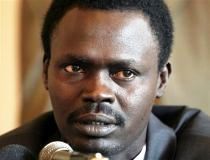Sudan ruling party doesn’t want peace – Minawi
March 6, 2007 (KHARTOUM) — Sudan’s ruling party has no desire to end the crisis in Darfur and is still largely to blame for the chaos there, a former rebel leader, who joined the government after a peace deal last year, said on Tuesday.
 Minni Arcua Minawi said Sudan should hand over suspects to the International Criminal Court, in the first public split within the government led by President Omar al-Bashir, which has rejected sending Sudanese nationals for war crimes trial abroad.
Minni Arcua Minawi said Sudan should hand over suspects to the International Criminal Court, in the first public split within the government led by President Omar al-Bashir, which has rejected sending Sudanese nationals for war crimes trial abroad.
The former Darfur rebel leader said his eight months in office in the Sudanese capital had been a disappointment.
He regretted being unable to persuade Bashir’s National Congress Party (NCP) to do more to end years of bloodshed in Sudan’s western province.
“If there was political will from Khartoum then the situation in Darfur would be calm,” Minawi told Reuters. “There is not heavy fighting now, but there is chaos.”
Minawi was the only one of three rebel leaders to sign a deal over Darfur that offered him a senior role in government and promised a truce to end a conflict experts say has killed 200,000 people and forced 2.5 million others from their homes.
But the peace plan was undermined by the refusal of other Darfur groups to sign and fighting barely ceased. That left Minawi isolated both in his home region, where he was disowned by many, and in Sudan’s capital, where he struggles to be heard.
Analysts say Minawi’s predicament illustrates the strategy of the Islamist-dominated NCP of forming coalition governments with opponents under foreign pressure but refusing to share real power with them in Africa’s largest country.
A peace deal that ended more than two decades of north-south civil war in 2005 set up a coalition with southern politicians who complain that the NCP is backpedalling on issues that threaten the ability of Bashir’s party to keep itself in power, such as disbanding militias and sharing oil revenue.
Despite his disillusionment, Minawi said he would not take up arms again, preferring to fight “by political means”.
DARFUR CHAOS
Minawi declined to identify the NCP figures he blamed for the violence in Darfur, where international observers say Arab militias continue the violence begun in 2003, when they were armed by the government to help its forces put down a rebellion.
“There are fingers meddling in Darfur to keep it in chaos — this is coming from Khartoum. This is what I have learned from my experience here (in the capital),” Minawi said.
The NCP fears further concessions on Darfur will force them to share real power in Khartoum, analysts say, and they are resisting pressure to accept United Nations forces there who they suspect will be used to arrest war crimes indictees.
Minawi said the government should not protect Ahmed Haroun, a junior minister who the International Criminal Court said last week it wanted tried for war crimes.
“He has to leave his work, his ministerial position. He has to resign immediately to move to the court immediately,” he said.
Revisions were possible to last year’s Abuja peace deal, Minnawi said, softening his previous opposition to changes to the text.
He was in touch with rebel groups that had not signed the Abuja deal and who have continued fighting. He said he had received “positive signals” from them.
Darfur’s rebels have split into a multitude of sparring groups with allegiances to different tribal, ethnic and individual goals, complicating international efforts to restart peace talks.
Minawi’s Sudan Liberation Moverment faction has been accused of fighting alongside government forces in the wake of the Abuja peace deal.
(Reuters)
